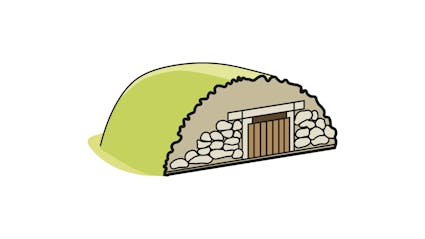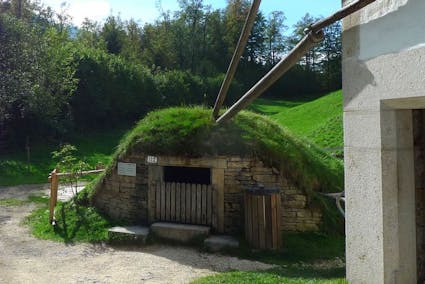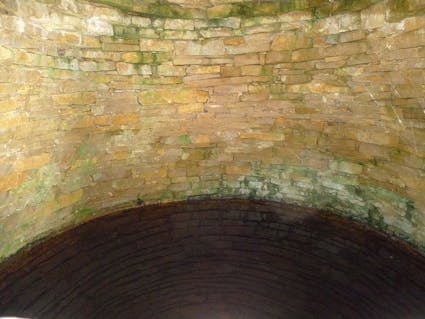112 – Cistern 18th Century (Reconstruction)
The cistern reconstructed in the Ballenberg Open Air Museum comes from the Jura mountain ranges. Due to the limestone bedrock in these hilly regions, the water supply was sometimes precarious: especially in karst regions, the water drained quickly and left only mere trickles, even in the valley floor.

Underground reservoir
The farmers of the High Jura found their own solutions to problems of water scarcity. They used the wide roofs as rain collectors and gathered the water in wooden gutters at the eaves, conducting it to nearby cisterns. This one at the farm of La Recorne held 5,000 litres (1321 gallons).

How to make a cistern
Stone brackets on the eave sides of the house carry wooden rain gutters. These conduct the water to the front of the house. There it funnels into readily visible wooden troughs and flows to the nearby reservoir – a round and vaulted cellar covered on three sides by earth. The water stays clean, is protected from summer heat and does not evaporate. A door keeps out thirsty animals. Anyone fetching water brings a bucket, enters the space and immerses it in the water. In later years a pump lightened the work.

Water scarcity
In the Middle Ages not only the castles on the hills and rock ridges but also the villages and cities below had to assure a water supply. Whilst cisterns could supply castles, in cities and villages groundwater wells or kilometre-long conduits had to be built. The water supply was particularly precarious in hilly regions with limestone bedrock; especially in karst regions, the water drained quickly and left only mere trickles, even in the valley floor. The mountain chains of the Jura where this cistern was built faced just such a situation.
Ballenberg
Swiss Open-Air Museum
Museumsstrasse 100
CH-3858 Hofstetten bei Brienz
Opening hours Administration
3 November 2025 to 8 April 2026
From Monday to Friday
8.30 am to 11.30 am
1.30 pm to 4.30 pm
Opening hours
9 April to 1 November 2026
10 am to 5 pm daily